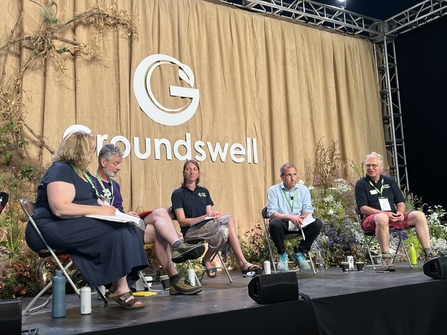Why attend?
I have a long-standing interest in the links between food, nature, climate and health. If we are to reverse the decline in biodiversity, clean up rivers and build climate resilience, then transitioning food and farming systems is the most important thing we can do.
In the past few decades, the impact of intensive agriculture has been seriously detrimental to the natural environment. Farming takes up 70% of all land in the UK, is responsible for at least a third of greenhouse gas emissions, the majority of nutrient pollution, and is the biggest driver of biodiversity loss due to habitat destruction and pesticide impact on invertebrate populations. Farming needs to change to wholly regenerative and agroecological methods if we are to have any hope of restoring nature.
And farming needs to change for wider economic reasons too, especially in relation to food security and public health. A recent Defra report cited climate change, biodiversity loss, soil degradation, compaction and erosion as all being huge risks to food security which will cost the UK economy £1.2bn a year. On top of this, overseas food imports are likely to be harder hit by climate change, further impacting food security. When it comes to public health, 60% of diets are now dominated by ultra-processed foods and 64% of UK adults are overweight or obese, adding huge costs to the NHS.
To me, it’s crystal clear that the transition to regenerative and agroecological methods of farming is vital for nature, our health, food security and the economy.
Sadly, there is still a lot of polarised debate in the media framing a false narrative that we have to choose between nature and food, that we can’t have both. Not true. The anti-environment rhetoric against net zero and rewilding for example is incredibly unhelpful.
But if the participants at Groundswell are anything to go by, there are a huge number of farmers who don’t listen to that nonsense, who are up for the challenge and who are already moving rapidly in the right direction. At the Trust, we know nature recovery cannot happen without farmers, but we also know healthy nature can support farming. Better connections between sectors need to be made.
So, we went along to listen, learn and connect.
What we learned
There was a lot of discussion around the broken food system – but the system is only broken for some. For the huge corporations who profited from it, it’s not broken at all. The food system we have was designed to provide plentiful cheap food to the masses, but this has had unintended consequences for farmers, public health and of course the environment – all of which are suffering. Henry Dimbleby’s National Food Strategy was mentioned time and again as having a lot of the answers and many participants were keen to see the new Government dust it off and implement it in full. The National Food Conversation run by the Food, Farming and Countryside Commission has shone a light on some of the shocking problems with the food system, why trying to eat healthily is not as easy as it should be, and why food education has a key role to play.
The future of the industry is suffering too, with 67% of farmers aged over 60. There is a desperate need to get more young people into farming, especially those wishing to lead the way on the transition to nature and climate-positive methods of food production. What was refreshing was the number of young farmers with an entrepreneurial mindset so clearly leading the conversations at Groundswell, including a great panel discussion about new entrants into farming hosted by the Nature Friendly Farming Network, a really positive sign for the future.
Climate change is already hitting farming hard, and we heard many sobering stories of farms not being able to plant up to 40% of their land area due to flooding this year, a huge dent on profitability. But rather than bemoan this, we heard lots of positive and creative discussions about how to farm in an age of climate change. Adaptation is clearly high on the agenda.
Animals are key to building soil carbon and soil health, and the practice of adaptive multi-paddock grazing (also known as mob grazing) is growing in popularity. It mimics what might happen in wild ecosystems where herbivores graze in herds that are constantly being moved on by predators, leading to short periods of intense grazing, trampling and dunging in small patches, followed by long rest periods in between for the plants to recover. Mob grazing needs no artificial fertilisers, it increases farm resiliency, positively impacts animal wellbeing, increases carbon sequestration, improves soil biodiversity, and ultimately leads to better human health. Our partnership with Nunwell Home Farm on the Isle of Wight is showcasing this approach with great results.





